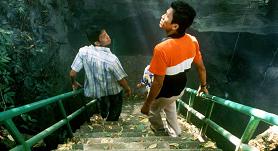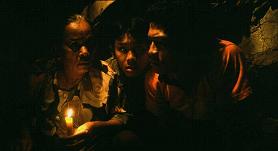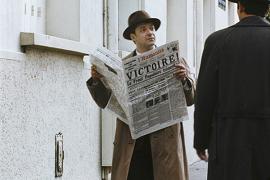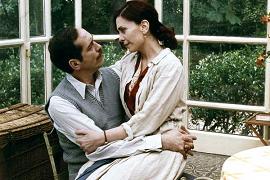|
Joker Recommends
|
-Top 20 List
-House of Flying Daggers
-The Aviator
-Bad Education
|
|
Yun-Fat Recommends
|
|
-Eight Diagram Pole Fighter
-Los Muertos
-Tropical Malady
|
|
Allyn Recommends
|
|
-Eternal Sunshine of the Spotless Mind
-Songs from the Second Floor
|
|
Phyrephox Recommends
|
-Top 20 List
-Design for Living (Lubitsch, 1933)
-War of the Worlds
-Howl's Moving Castle
|
|
Melisb Recommends
|
-Top 20 List
-The Return
-Spirited Away
-Spring, Summer, Fall, Winter...And Spring
|
|
Wardpet Recommends
|
|
-Finding Nemo
-Man on the Train
-28 Days Later
|
|
Lorne Recommends
|
|
-21 Grams
-Cold Mountain
-Lost in Translation
|
|
Merlot Recommends
|
-Top 20 List
-The Man on the Train
-Safe Conduct
-The Statement
|
|
Whitney Recommends
|
|
-Femme Fatale
-Gangs of New York
-Grand Illusion
|
|
Sydhe Recommends
|
|
-In America
-Looney Tunes: Back In Action
-Whale Rider
|
|
Copywright Recommends
|
Top 20 List
-Flowers of Shanghai
-Road to Perdition
-Topsy-Turvy
|
|
Stennie Recommends
|
Top 20 List
-A Matter of Life and Death
-Ossessione
-Sideways
|
|
Jeff Recommends
|
|
-Dial M for Murder
-The Game
-Star Wars Saga
|
|
Lady Wakasa Recommends
|
|
-Dracula: Page from a Virgin's Diary
-Dr. Mabuse, Der Spieler
-The Last Laugh
|
|
Steve Recommends
|
-Top 20 List
-Princess Raccoon
-Princess Raccoon
-Princess Raccoon
|
|
Jenny Recommends
|
|
-Mean Girls
-Super Size Me
-The Warriors
|
|
Lons Recommends
|
|
-Before Sunset
-The Incredibles
-Sideways
|


|
(c)2002 Design by Blogscapes.com
|
The Blog:
|
From the 42nd New York Film Festival: The Holy Girl
An Argentine hotel serves as the setting in Lucrecia Martel’s smart, faux-languorous second film, The Holy Girl. Th  e location is of paramount importance to Martel’s characters, which are stuck in a hesitant transient state embodied by the idea of a hotel in constants flux of people, ideas, and possibilities. For Dr. Jano (Carlos Belloso), the affliction seems temporary. He is staying at the hotel for a weeklong medical conference but his attention wanders first to a momentary sexual molestation in a crowd, and later, and with less feeling, to Helena (Mercedes Morán), a divorced local woman. Helena is an events coordinator at the hotel and lives there with her teenage daughter Amalia (María Alche). Separated physically and emotionally from her ex-husband who is now married and expecting twins, Helena is suffering not just spiritually but physically as well, from a quasi-mysterious constant ringing noise in her ear, reflecting a discontinuous, tragically out of tune relationship with the world around her. Though Hel  ena’s brother also works at the hotel she really has only her daughter to herself and quickly gravitates to the muted, passive come-ons of Dr. Jano. While Jano readily engages in conversation with Helena, the excursion from real life represented by the conference get-away leads him to briefly indulge in his perversions, however harmless in actual conduct. It turns out that the girl he molests is Amalia, who, inspired by her class on Catholic vocations, sees in the character of Dr. Jano a person she can help. How exactly she plans on doing this is a mystery Amalia keeps to herself, and when Dr. Jano realizes she is Helena’s daughter and his perversion loses its anonymity, he physically repulses her attention, avoids contact with Helena, and tension inside the hotel builds.
With a remarkable directorial assurance, Martel crafts a film that is paradoxically sharply realized and almost dreamy in its evocations. The hotel atmosphere is one of perpetual haze despite the constant comings and goings, and lends well to the building’s inherent nature as a fleeting stopover. Unfortunately, Amalia and Helena are required to live there and cannot use the hotel as a retreat from family or morals as many of the other doctors do, indulging in sexual escapades and heavy drinking away from their practices and families.
Amalia’s typical teenage curiosity and search for self-meaning is personified in her interest in her orthodox Catholic class, which stringently encourages its girls to find historical stories exemplifying the godly vocational calling of women. Though Amalia mem  orizes long prayers and incantations for frivolous reasons, and her desire to find a vocation in her life may not be an earnestly religious one, they are both outpourings from the same source-a teenager who is beginning to feel the need for a purpose in life to define herself. That her mind blurs the distinction of moral good by helping Dr. Jano and physical pleasure by trying to indulge and encourage his perversion points to a sincere attempt at a confused objective. The plight of other characters echo that of Amalia, though the adults are more resigned to their fates, and those stuck forever in the hotel (Helena, needing a man; Helena’s brother, who is separated from his Chilean wife who took their children back to Chile) are at the mercy of the momentary diversions provided by the traveler turnover of the hotel.
Martel employs unusual variations on conventional blocking and a noticeable manipulation of The Holy Girl’s sound design to layer her film atmospherically and formally in what could have been a featureless dramatization of a young girl desiring a  n older man. Diversions into near-dream imagery-Amalia and her girlfriend’s giggly panicked run through a forest that was a scene of an accident; a sonic attempt at seduction; the lazy, tender moments spent between Amalia and her best friend Josefina (Julieta Zlyberberg)-keep Martel’s subtle, intelligent direction attuned with the story’s purposeful lack of definition, elaboration, or conclusiveness. The Holy Girl may not have the most explicit of narratives, but the strength and allure of its gentleness, subtly, and aura are evident right from the start, and Martel’s already-mature directorial vision guides the film satisfactorily to its unexpectedly, but understandably, fleeting conclusion.
From the 42nd New York Film Festival: Or
Its English title named after its lead, Or, an Israeli working teenager responsible beyond her years (Dana Ivgi), but with the alternate title Mon Trésor (“My Treasure”), Keren Yedaya’s film immediately points to its central concern: the taut, dependent relationship Or’s passive, infantile mother Ruthie (Ronit Elkabetz) has with her caring, overburdened daughter.
Or is Ruthie’s treasure, and by that she means that Or, with remarkable patience and perseverance for a girl her age, dotes on her mother as she would a child, and attempts to guide Ruthie’s life away from her habitual profession as a cheap street prostitute. Or has to juggle caring for her mother and school at the same time as working as a dishwasher to provide the family’s income. Pulling some strings with her friends, Or is able to get her mother a job as a housecleaner, which brings in a steady income but one substantially lower than tricking. The draw of the street to Ruthie seems something more than money, and her infantile and passive behavior points towards a pathological routine that to recover from requires the kind of undue attention that Or cannot provide.
Burdened with the responsibilities of a working single mother at the same time as faced with the usual teenage turmoil of high school (studying, boys, self-esteem, self-identity, etc.), Or’s amazing stand of confidence in her ability to care for her mother and maintain her lifestyle gradually erodes as her mother continually falls into past patterns of relying on the street for quick and easy money. Towards the beginning of the film, after work and on her way home, Or stops off to bum a smoke and talk to what appears to be some male friends. She and a youth pair off and go make out in the shadow of an alley. What initially looks like a moment of brief reckless passion and a return to teenage motivations sadly foreshadows the slow downslide of life and morality that Or’s mother’s dependence on “her treasure” will entail.
Keren Yedaya’s film is spare, effective, and an aesthetically consistant debut which reiterates, or, in harsher terms, provides a mere variation on, a well-worn story. With two stunning lead performances the best thing that can be said about Or is that it is extremely watchable. This is despite the fact that from the first ten minutes on Yedaya sets up her film’s situation so thoroughly that Or contains not a single surprise, narrative or thematic. With Elkabetz’s tragically passive bi-polar performance and Ivgi’s plucky, reticent this-is-just-a-matter-of-the-course attitude, the leads balance each other out in a way that, though one knows what will happen in a given scene, one still wants to watch the actresses to see what they do with it. Yedaya’s single-camera setups cast a sad sympathy for Or’s character, relegating to the cramped spaces, and the corners of the frame. Though systematic, this aesthetic system does not provide a fresh take on the material any more than the performances, however immersive, make Or’s narrative one of originality.
There is, however, one large ambiguity in the film, intended or not, which provides an on-going glimmer of interest. Though Or clearly has a profound love for her mother, her mother’s feeble returned affection casts doubt on the position her daughter occupies in her life. Is Or truly Ruthie’s treasure? The journey Or begins to take at the end of the film-a paramount assumption of responsibility that at the same time degrades her life and her morals-suggests she may one day have the passive hardness of her mother. The only fresh thing in Or is a true tragedy-calling into question the ability to see love in another.
From the 42nd New York Film Festival: Tropical Malady Tropical Malady is split in two narrative sections, erotically and sumptuously connected in themes and imagery. In the first half, Keng (Banlop Lomnoi), a soldier assigned to a forest division, works at a heartfelt, but disparate relationship with Tong (Sakda Kaewbuadee), a young man he met on a mission in the jungle. Thai director Apichatpong W  eerasethaku’s film begins with a philosophic quote reasoning that humans are beasts who must act as trainers to suppress their beastliness, and tension between the primal and the modern is most apparent in this section’s alternately deeply passionate and awkwardly incongruous romance. Tong possesses a background ripe with tradition-his grandfather tells stories of ghosts, his uncle claims to remember 200 years worth of past lives’ memories-and he himself remains unsophisticated in his illiteracy and life in the countryside. When he comes to town he wears the camouflage of the military and when asked if he is a soldier he replies that he thinks the uniform will help him get a job, but really the camouflage seems like a naïve attempt to blend into an unfamiliar and unfriendly environment. Keng’s situation is not elaborated on as much, but his generic homoerotic evocations stemming from his military friendships try to find a permanent object of love in Tong’s sweet country boy.
Both men seem at once willing to embrace their relationship and filled with abstract trepidation. Tong nearly ref  uses to go into town with Keng, so much of their time is spent in the countryside, gazing at the jungle, and languidly hanging out with Tong’s family. In a critical scene, the two lovers descend into a sacred cave and are told a legend about traveling through a dangerous passage where only the blessed with survive. Tong is eager to engage the tradition and venture into the blackness, but Keng is notably frightened. Though both willing, neither man is capable of taking their mutual affection to the next step, and each moment of intimacy is awkward and tentative. It always seems like their affection is able to exist but unable to express itself physically or totally.
During a late-night drive Tong stops to take a leak on the roadside, and in a gesture of intimacy Keng passionately tongues Tong’s hand. Tong is amused at first, but then tries to sink into the physical feeling, and then attempts to return the favor. Keng laughs, equally unphased by the experience, and Tong walks away from him, disappearing into the night. At this point Tropical Malady shifts a mythic spiritual re-envisioning of the first half’s pus  h-and-pull attempts at intimate connection. In this story a lone soldier (Keng again) enters a vast jungle to track down a missing villager who is harassing the area around Tong’s village, this time going to far as to steal cattle. The audience is told in titles that there is a legend of a shaman able to take on the form of animals and that his spirit terrorizes visitors of the forest. The soldier quickly catches on to his mystic quest when human handprints in the mud turn into those of a tiger. Catching a glimpse of a naked man covered in elaborate body tattoos, the soldier gives chase and fights with the being, but the strange man triumphs and expels the unconscious soldier from the forest. Undeterred, the soldier again resumes his quest, which gradually evolves from that of investigation, to punishment, and finally to acceptance and desire to enter the spirit world.
Apichatpong Weerasethaku continues to experiment with the unusual evocations possible in non-narrative feature cinema. Tropical Malady, like Blissfully Yours before it, returns to the drugged haze of the jungle to allow humans to attempt transcendence. The soldier’s primal wanderings and eventual embracing of his “beastly” nature points allusively to the Tong’s inability to achieve a permanent, meaningful homosexual relationship. That the simple country boy courts military men aligns him with the side of the beast working with frustration at the most trained and repressed of male humans. The imagery of the film’s first half, though as unusual, non-narrative, and inventive as anything Weerasethaku has done, is that of tentative borders between the town and the country, the spiritual and the material.
It is not until the soldier, torn fromhis inability to fully contect with Tong, readily plunges by himself into the rich, dense mesh of the forest that Tropical Mala dy dy suddenly seems able to fulfill itself. As he retreats away from civilization, the space that separates him from his jungle ghost prey collapses in an entwinement of vines, trees, dirt, and foliage. The soldier’s languid jungle journey, filled mysteriously with horror conventions, humor (including a talking monkey who advises the soldier on his quest), and magic, suggests that those bound to the elaborately “trained” existence of constructed, refined, modern life must go through a near-impossible, primal journey to transcend a life of spiritual limitation. This in itself is not a hopeful message. But that Weerasethaku ends his film on the mystic positivism rather than the tangible story of a troubled relationship is an indicator that the possibly, however difficult and unlikely, certainly exists. Tropical Malady offers hope for those bewildered by their inability to consummate human relationships, indicating that the problem is one is spirit, and that indeed, it is one that is possible to transcend.
From the 42nd New York Film Festival: Triple Agent 1936, Paris. “Spy fever” has gripped the populace as the Popular Front achieves a resounding turnout at the polls and France’s Leftist government is placed in a precarious  position between Bolshevik Russia and Nazi Germany. Caught up in the middle are White Russian general-in-exile Fyodor (Serge Renko), and his wife of Greek birth, Arsinoé (Katerina Didaskalu). Ostensibly working for a veterans association of expatriates who fled after the Russian civil war, Fyodor in fact is a spymaster pulling strands of information from the tumultuous state of Soviet Russia, the rising Communist threat in France, and the fascism spreading from Germany and Italy to Spain. Continuing the thematic thread of deception, Eric Rohmer’s film, with the thriller-ish title Triple Agent, is, in fact, a marital drama framed by massive political events rather than the other way around. The film offers brief scenes of the marriage, almost all of which are restricted to domestic social spaces, separated by monthly title cards and interspersed with archive footage of the evolving national and European contemporary political developments. The contrast between the massive historical upheavals and the relative stillness of the lengthy domestic conversations provides a quivering, thin layer of normalcy that seems more fragile than the warm, comfortable rapport between the couple leads one to believe.
The brief, but telling antagonism that seeps into the marriage is the realization that, while Arsinoé’s private relationship with her husband is one full of love and reticence, is in social environments Fyodor freely, though vaguely, opens up about both his work as an anti-Red and the European situation in general. Arsinoé’s sense that her husband  is keeping things from her, however trivial, comes to a heads and distresses that Fyodor talks more of his ideas and work with friends then with her. Fyodor calms her down with a lengthy and allusive argument about him having to lie in social situations and not wanting to lie to her, but when he next hides the true destination of a business trip from her she becomes indignant at the deception. Once again Fyodor calls upon his talents as a highly intelligent diplomat of manipulation, this time to bore her with his supposed naïve-amazement at the power he has behind the scenes of international politics. Each time Fyodor is able to placate his wife, but eventually outside political events have the force to break into their comfortable domestic redoubt and force Arsinoé to tangibly question her perception of her marriage.
Triple Agent is an allusive, theatrical, and disarmingly airy film about the layers of illusion, self-deception, and manipulation in an innocuous marriage. Rohmer isolates the principal drama of his film to restri  ctive interior sets, letting information trickle into Arsinoé’s life only through the frustratingly uninformed talks between neighbors, her husband’s friends and colleagues, and Fyodor himself. The audience is given larger contextual information in the form of chronological title cards and extensive historical footage, but in the scheme of Triple Agent the information can only be taken at face value. Rohmer uses a highly articulated mise-en-scene framing actors in front of clear windows or multiple open doorways in cramped spaces, and providing continual visual motifs of subjective perception to elaborate visually the implies gap of sincerity and comprehension between Fyodor and Arsinoé. Photographs, radio announcers, newspapers with various political leanings, and most emphatic of all, Arsinoé’s domestic hobby of painting (which importantly is about the simple appearances and interaction of people among quaint, common social situations) places deception and misapprehension at the height of importance.
Arsinoé, who is innocent and loving and politically carefree, is the victim of the film, and the character least aware and most baffled by the machinations of deception. What she sees as a naivety about the political world is really blindness to Fyodor’s blurring of his political world and that of his marriage. Unfortunately, Rohmer keeps both charact  ers from the audience in a vaguely theatrical style that places this allusive, atmospheric tension above the heads of all the characters and rarely in between them. That is the nature of the deception to be sure, but it results in a variety of exchanges that purposefully elude direct meaning and exist mainly to subtly reinforce or elaborate on the greater overarching problems in the couple’s nondescript marriage. There exists sympathy for the situation, but hardly sympathy for the characters. Placed within such a heavy historical context the characters are unbelievably distilled for a Rohmer film, and much of the film survives on the mannered performances (Renko’s in particular nails the pleasure he takes in watching his diplo-spy tactics string along his spouse) rather than a psychological understanding of either Fyodor’s pathological deception or Arsinoé’s complete misreading of her marriage.
|
|

